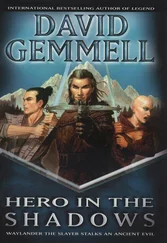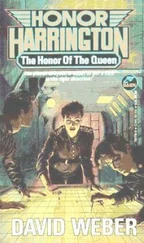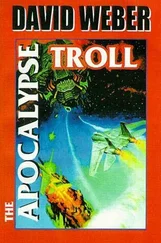But, as she'd said to McCormick, better safe than sorry. That could have been the motto of Perimeter Security Command instead of the official "Always Vigilant," and Epstein, like virtually all of the officers assigned to PSC, took her responsibilities very seriously indeed. They were there, maintaining their endless watch, precisely to make sure everyone knew they were, which meant no one would even make the attempt to evade their all-seeing eyes. Checking out the occasional ghost was a trivial price to pay for that.
Commander Michael Carus, the commanding officer of HMS Javelin , and the senior officer of the second division of Destroyer Squadron 265, known as the "Silver Cepheids," sighed philosophically as he contemplated his orders.
At least it was something to do, he supposed. And he wasn't surprised they'd gotten the call. The squadron had earned its name from its demonstrated expertise in reconnaissance and scouting, although he'd always wondered if it was really all that appropriate. Cepheids were scarcely among the galaxy's less noticeable stars, after all, and recon missions were supposed to be unobtrusive.
"Here, Linda," he said, handing the message chip to Lieutenant Linda Petersen, Javelin 's astrogator. "We're going ghost hunting. Work out a course, please."
"To hear is to obey," Petersen replied. She plugged the chip into her own console, then looked over her shoulder at Carus.
"How big a hurry are we in, Skipper?" she asked.
"The datum is already almost thirteen hours old," Carus pointed out. "I feel sure our lords and masters would like us to go check it out before it gets a bunch older. So I'd say a certain degree of haste is probably in order."
"Got it, Skip," Petersen said and began punching numbers. A couple of minutes later, she grunted in satisfaction.
"All right," she said, turning her chair around to face Carus. "This is going to be a really short jump, Skipper. Not quite a micro-jump, but close, so if we build up too much velocity—"
"Once upon a time, in the dim mists of my youth, all of, oh, three years ago, I was an astrogator myself, my daughter," Carus interrupted. "I seem to have a vague recollection of the undesirability of overrunning your translation point in a short hop rattling around somewhere in my aging memory."
"Yes, Sir," Petersen acknowledged with a grin. "Anyway, what I meant to say is that I'd just as soon not get much above forty-two thousand KPS as our base velocity. That gives us a total flight time of about three hours—a tad less than that, actually—if we hit the theta bands."
Carus nodded. As he'd just said, he'd been an astrogator himself, once, and his own mind ran through Petersen' decision tree. Translating steeply enough to hit the theta bands in a relatively short hop like this would probably take a couple of hours off the ships' hyper generators and alpha nodes, but it wouldn't be too bad.
"Figure about five hundred gravities?" he said.
"That was what I was thinking. Take us about two hours to hit our transit velocity at that rate. I don't see any point pushing it harder than that and risking overrunning the translation point at the other end."
"Sounds good to me," Carus said, and turned to his communications officer.
Three hours later, the destroyers Javelin, Dagger, Raven , and Lodestone arrived at the ghost footprint's locus and began to spread out.
"You and Bridget take the outer perimeter, John," Carus said, looking at the trio of faces on his divided com display. "Julie and I will take the inner sweep."
"Understood," Lieutenant Commander John Pershing of the Raven acknowledged, and Lieutenant Commander Bridget Landry, Dagger 's CO nodded.
"Which of us plays anchor?" Lieutenant Commander Julie Chase asked from Lodestone 's bridge, and Carus chuckled.
"Rank hath its privileges," he said just a bit smugly.
"That's what I thought," she huffed, then smiled. " Try to stay awake while the rest of us do all the work, all right?"
"I'll do my best," Carus assured her.
"Almost exactly on schedule, Sir," Commander Kolstad observed. "Nice to have punctual enemies, I suppose."
"Let's not get too overconfident, Felicidad," Admiral Topolev responded, giving her a mildly reproving look.
"No, Sir," Kolstad said quickly, and he allowed his slight frown to turn into an encouraging smile, instead.
If he were going to be honest, Topolev supposed, he wasn't immune to the ops officer's sense of euphoria. In the roughly seventeen hours since their arrival, their velocity had increased to better than forty-five thousand kilometers per second, and they were almost a hundred and thirty-eight million kilometers closer to their destination. Under most circumstances, 7.6 light-minutes wouldn't have seemed like very much of a cushion against military-grade sensors. Especially not against Manticoran military-grade sensors. The Mesan Alignment had plowed quite a few decades—and several trillion credits—into the development of its own stealth technology, however, and the MAN was at least two generations ahead of the Solarian League in that capability. Their analysts' best estimate was that their stealth systems were equal to those of Manticore at a minimum, and probably at least marginally superior, although no one was prepared to assume anything of the sort. But as the Manties' own Harrington had demonstrated at a place called Cerberus, the key element in any passive detection of a moving starship was its impeller signature . . . and Task Force One didn't have an impeller signature.
The Royal Manticoran Navy was the enemy, and Frederick Topolev was prepared to do whatever it took to defeat that enemy, but neither he nor Collin Detweiler's intelligence services were prepared to underestimate that enemy or permit themselves to hold mere "normals" in contempt. Especially not given the RMN's combat record over the last twenty years. The MAN was almost certainly the galaxy's youngest real navy, and its founders—including one Frederick Topolev—had studied the Manties, and their officer corps, and their battle record with painstaking attention. They'd learned quite a few valuable lessons of their own in the process, and the admiral knew the crews of those destroyers were firmly convinced they'd been sent out here to investigate a genuine ghost. If anyone had thought anything else, they wouldn't have sent just four destroyers to check it out. But he also knew that, routine or not, the crews of those ships were doing exactly what they were supposed to be doing. He recognized the standard search pattern they were running, knew their sensor crews were monitoring their instruments and their displays intently. If there was anything out there to find, those destroyers would find it.
Except that no one in the entire galaxy knew how to find it. Knew even how to recognize that there was something out there to find. And so, despite the absurdly low range, and despite his own ships' ridiculously low top acceleration rate, Topolev felt just as confident as he looked.
"I wish I could say I was surprised," Elizabeth III said in tones of profound disgust as she flipped her hard copy of her cousin's report of the Second Battle of New Tuscany onto the same conference table in the same conference room. The initial report had arrived three days ago, with the news of Josef Byng's stupidity and the destruction of his flagship. That had been bad enough, but the rest of what Michelle had turned up after the battle was even worse, and the queen shook her head, her expression tight with anger.
"The Sollies have resented us for years," she continued harshly, "and we've walked on tiptoe around them for as long as anyone can remember. I guess something like this had to happen sooner or later, even if the timing could have been a lot better. In fact, I suppose the only thing I'm really surprised about is who seems to have arranged this entire—what's that charming military phrase? Oh, yes. This entire cluster fuck ."
Читать дальше












